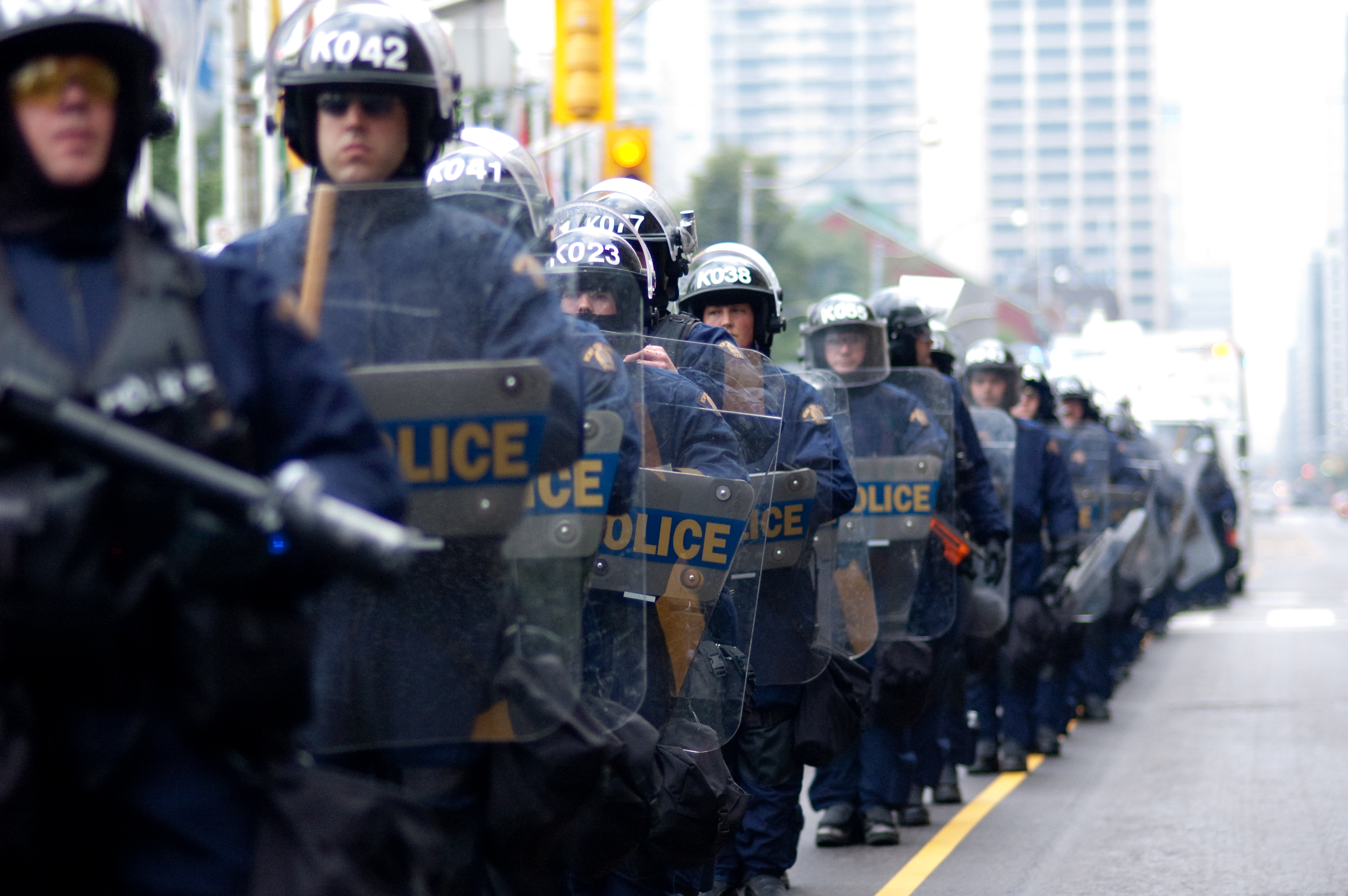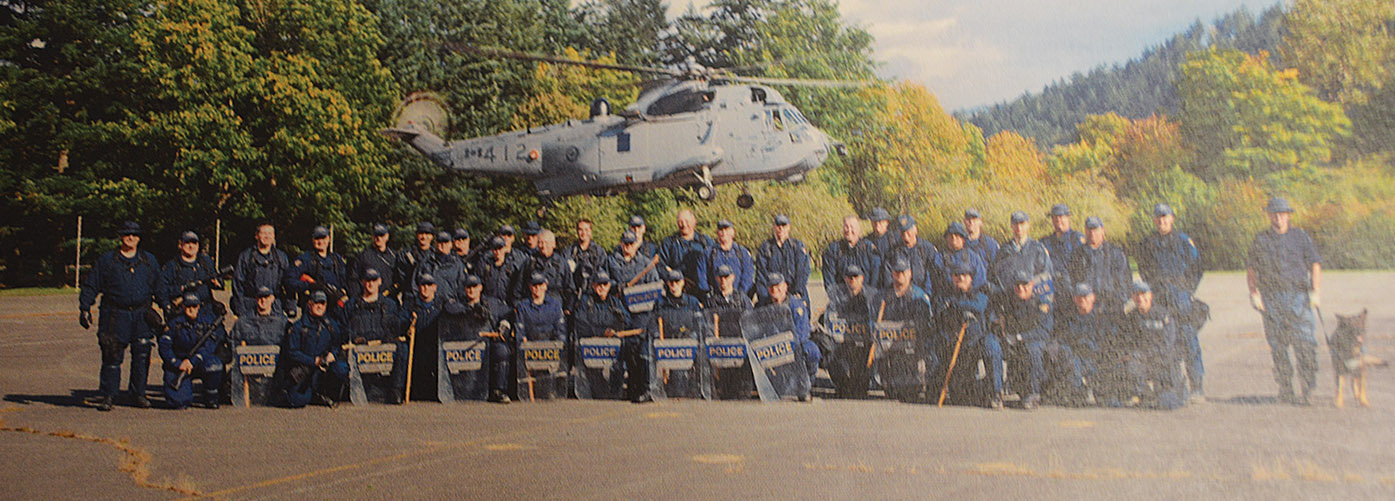Const. John Clemens of the Campbell River RCMP spent 31 days at the Winter Olympics in Vancouver in 2010 and loved it. But as a member of the Vancouver Island Tactical Team (VITT) he had a very different experience than your average sports fan.
Clemens and other VITT members worked 15-hour days, searching all the venues before people got there and dealing with protesters.
“I was right in the centre of the protest at the Olympic opening in Vancouver,” he recalled. “We had 300 protesters trying to break the line and go inside and disrupt the opening ceremonies; not many people know about that. We brought in the horses and we were liaised with the Lower Mainland [tactical] team and Vancouver PD and we stopped them. They were trying their best to get through us, but we didn’t allow it. We were co-ordinated; they weren’t. We practice that co-ordination to move as a troop.”
Clemens is a season pass holder for Nordic skiing at Mount Washington, so he told the boss “if you have anything to do with Nordic skiing at the Olympics, I’m your guy.” He ended up being placed at the finish line for the cross-country skiing, and he worked at the Callaghan Valley venue where they held the ski jumping.
“First, we had to search for [improvised explosive devices], all of the venues there, and then I got posted right at the bottom of the ski jump, right dead centre where they’re coming at me after the jump, to keep people from coming there and from taking pictures because if you come too far, they can run you over,” he said. “It was really weird to see them coming straight at me. I was back far enough that they never landed near me but it sure looked like they were going to. It was quite something. And we had to search that venue from top to bottom.”
Clemens, who has been a police officer for 28 and a half years, spent three years with the Lower Mainland Tactical Team and has been with the Vancouver Island Tactical Team for 11 years.
Clemens says there are an average of 40 to 60 members on the team, and members volunteer to join the team from detachments all over Vancouver Island, coming together to train at CFB Comox each year.
The Tactical Team gets called out to different events and is trained in riot tactics and specialized searches, searching for people, bombs and items.
 Besides the Vancouver Olympics, Clemens has also gone with the VITT to protests at Bear Mountain, a search for a missing person in Courtenay, protests for LNG drilling at Burnaby Mountain, the Stanley Cup riots in Vancouver, the Martin Mountain wildfire in Kamloops where they had to evacuate people and make sure looters didn’t come in, a homicide on Salt Spring Island where they were tasked with interviewing people, and most recently, Clemens went to Houston this October, where there were protests against the pipeline.
Besides the Vancouver Olympics, Clemens has also gone with the VITT to protests at Bear Mountain, a search for a missing person in Courtenay, protests for LNG drilling at Burnaby Mountain, the Stanley Cup riots in Vancouver, the Martin Mountain wildfire in Kamloops where they had to evacuate people and make sure looters didn’t come in, a homicide on Salt Spring Island where they were tasked with interviewing people, and most recently, Clemens went to Houston this October, where there were protests against the pipeline.
One of Clemens’ favourite assignments was escorting the Olympic torch on Vancouver Island. The Tactical Team members were in the vans protecting the runners and were always there in case anything happened, travelling with the torch the entire way.
“[The Olympics] and the Olympic torch events, for me, were very meaningful,” said Clemens. “Very proud to be part of it. I actually have a picture at home of me with the Olympic torch at home. One of the runners said ‘here.’ I said, ‘I want to take your picture,’ and they said ‘why don’t you get someone to take a picture of both of us.’ That was great. And the enthusiasm of people everywhere we went was amazing. It was fun. I am very proud of what we did for the Olympics. It was great to be there. My son was at UVic at the time and he brought all his friends down because I phoned him to say ‘we’re going to be at this intersection in five minutes,’ and they were all there and they started singing ‘O, Canada’ and there were 100 of them.”
Members from Vancouver Island will get called out as reinforcements for other teams for large events, and Clemens was one of six Vancouver Island members assigned to the Ontario team at the G20 riots in downtown Toronto in 2010. Not all members can go at once; it depends on their availability and if their home detachment has enough members at the time to let them go.
“It’s an exciting part of what we do,” said Clemens. “That’s why I’ve stayed with it a long time.”
Five members of the Campbell River RCMP Detachment belong to the VITT. Each detachment is required to provide members, and Clemens says there are always members waiting to get on the team.
“We have one of the most respected Tactical teams in B.C.,” said Clemens. “We got lots of kudos and lots of calls because we do a good job and we are well trained. The trainers have been with the team for a long time, and they have been tasked with going to other countries, to England and the United States, to show them how to do proper searches. We were originally trained by search trainers who are ex-London policemen.”
Members of the VITT all have different kinds of training, such as shooting less-lethal projectiles or using gas. Clemens is trained to be one of the members who holds the line against protesters.
“I like it on the line,” he said. “You’re up front and it’s central to everything that’s happening.”
Clemens decided to join the Tactical Team after a friend of his, who was a team member, suggested he join. He had always been into physical activity, and he was a Canadian Armed Forces Reservist when he was younger, so it was a good fit. Clemens wanted to be a police officer “right from the get-go.”
“My high school picture shows ‘plans on attending St. Mary’s University and then joining the RCMP’ and that’s exactly what I did,” he said.
“It was leading towards that, from Scouts Canada right through to the military and to campus police and in charge of the residence at St. Mary’s, and martial arts for a long time – so it all led to this job.”
Clemens thinks the most challenging parts of being on the VITT are stamina and physical fitness. Members spend hours at a time marching in heavy gear and get shot at with gas.
“We have to hold the line,” he said. “It’s very strict discipline. We don’t engage until we are instructed to do so, so we stand there and we don’t retaliate, we don’t do anything until we’re instructed to do so. It takes a lot of self-confidence to stand there when people are attacking you. These guys are tough who are on the team. It’s a good thing to belong to.”
One of the biggest benefits, he thinks, is the camaraderie and team effort that comes with it.
“They’re all team players who are on the troop, and they all work pretty good together,” he said. “They’re a good representation of the RCMP.”